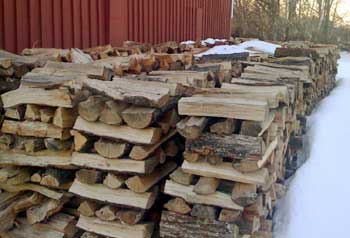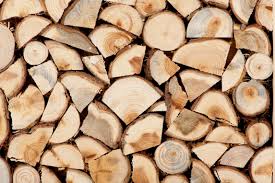Logs - the best types of logs to use for firewood
The kind of fire you would like produced by your firewood is greatly influenced by the type of logs you go for. Whether it is a glowing heat or blazing flames will depend on the logs selected for firewood. Your choice of logs for firewood should involve a careful consideration of factors such as length of burning, amount of heat, ease of use, sparks given off, scent etc.
Hardwoods
Generally, hardwoods are denser than softwoods hence burn down to form glowing coals which give out more radiant heat and tend to last for longer. There are a number of such hardwoods to consider as logs for firewood. Ash is perhaps one of the best logs to consider for firewood; it produces much heat, flames well and burns quite well even when green. Beech also produces great heat but not as great as that of the Ash; however, it is better mixed because it produces embers. Although Birch burns quickly, it is known for its good heat and nice scent when burning. Then there is Hawthorn, also one of the logs to burn, it burns slowly generating a lot of heat; however, it is not readily available. Hazel is worthy for burning but produces some sparks. Oak, is dense and burns slowly to yield a bed of hot, glowing coals making it one of the best logs to use for heating. However, Oak requires to be seasoned well for the best results. It also has one shortcoming; the amount of ash it yields.
Sycamore flames well but produce relatively lesser heat compared to Oak and Ash; however, it is readily available and good for mixing with other logs. Maple burns well to produce good heat but it is not common. Rowan, also called the “Mountain Ash”, burns quite slowly and produces good heat. Blackthorn is known for its slow burn which yields good heat and its relatively low quantity of smoke during the burning. Walnut is a great burner but rare. Yew is another nice slow burner also known for its pleasant scent especially when seasoned for longer. However, it is not common and contains a toxic substance making it unsuitable for use in open fires.
Although
some hardwoods may be good for firewood, they may be exonerated for one reason
or the other. Some are fruit trees such as Pear, Plum, and Apple. These logs
are good for burning but since orchards need to be protected, it may be unwise
to use them for firewood. Others such as Elm may be unsuitable because of the
much smoke they produce and difficulty in burning.
Softwoods
Although hardwoods form the bulk of logs worth consideration for firewood due to their level of heat produced, there may be a few softwoods which can be considered as well. Cedar, gives out relatively good heat and a nice scent when burning; however, it should be well-seasoned. Pine is known for its great flames and pleasant smell although it spits and sparks. Larch produces good heat and also a nice scent; however, like all softwoods, it burns out quite fast.
.
9 Firewood Advice Tips You Need To Hear

No matter what kind of firewood you are using, it will burn better if
it is properly seasoned. You may already know this, but I have a few
more advices you can use when it comes to firewood.
- Maple and oak are very hard woods, which makes them a bad fuel during the mild weather.
- Aspen, poplar, spruce and willow are softer woods and are a better solution when the heat demands aren't high.
- Make sure your firewood is processed in spring so that it can season properly.
- Make sure your firewood is 3 inches shorter than your firebox.
- If you want to easily maintain your fire, use shorter pieces.
- It's best if you can split your logs to several different sizes as this will make it easier for you to manage the fire.
- No matter how large is your furnace, you shouldn't have a 10" diameter pieces. 8 inches is the maximum.
- Wind falls and tree tops are good firewood, if they are not less than 2" in diameter.
- If you leave your firewood on the ground, it will attract mold and bugs. Make sure it never stays on the ground for more than a day or two.
What to Consider When Looking for Logs in Essex

A number of homeowners are finding it better to heat their homes using firewood in Essex. This is because; wood is a renewable source of energy, heating a home using wood lowers the over-reliance on fossil fuels whose costs keep on fluctuating. Also, using wood from local forests, that is, firewood in Chelmsford, Brentwood, Ingatestone and surrounds of Essex is a major way of supporting the local economy of the area. With the right fireplace, using wood for heating in a home can prove to be one of the smartest investments one can ever make.
Source
In case you are looking for logs in Essex to cut, you definitely need a source which is in proximity to your storage facility and one that can be easily accessed for transportation. If you have a facility for storage and seasoning of the cut logs, then finding wood that is relatively cheap is not hard especially in areas where trees are being cleared due to storms, right-of-way clearing or just logging. Logging and arboricultural activities may form a good source of your firewood Essex.
Processed wood
Processed wood is quite popular among many firewood users. This is because such wood is easily deliverable and requires a smaller space for storage. It is also convenient to use the wood because it is normally processed to fit your fireplace or stove. However, processed firewood goes for a premium cost due to the preparation, handling and delivery involved.
Ease of splitting
Splitting of your logs enhances drying of the wood. Splitting also reduces the wood to a size that can fit into the fireplace or stove. It is therefore necessary to look for logs which can be split easily. Some tree species such as elm are quite difficult to work with when it comes to splitting because they have interlocking grains; hence such species should be avoided from your logs list as much as possible. On the other hand, some tree species including most conifers are easier to split hence it is advisable to go for such.
Heating value and longevity
The heating value of your wood of choice is also an important factor to put into consideration. Normally, this depends on the density of the wood. Denser woods tend to have higher heating values compared to the less dense ones. This implies that if you go for lighter woods such as cottonwood or willow, you will require much wood than what you will require if you went for denser woods such as heavy oak.
Another important factor to consider when looking for your firewood is the ease of start of the given wood. Some wood species have an easier start compared to others; however, some of those woods produce much smoke. Also, different wood species have varying lasting capabilities; some tend to last for longer while others last for only a shorter period.
In conclusion, as you look for logs in Chelmsford and Brentwood surrounds of Essex, hopefully, the factors given in this article will guide you into getting the right wood that will meet your need.
